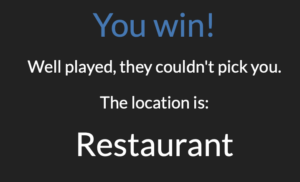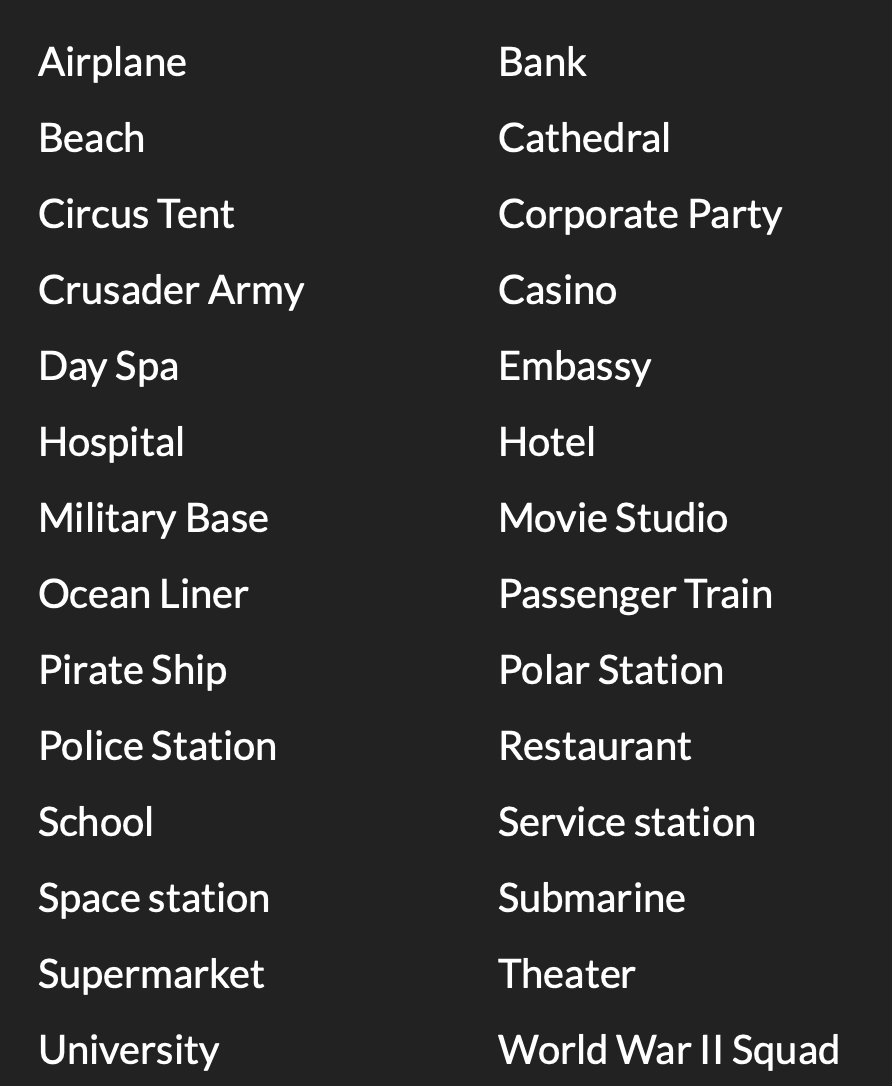Name of game, creator, platform
Spyfall was created by Alexandr Ushan as a card game and is now hosted on netgames.io as a web party game for 3+ players.

Target audience
Were the game to have a rating, it’d be E for Everyone. I played with my college friends and had a good time, but one of my friends had played with her younger cousins and the game also worked well. The easy-to-understand nature of the game makes it simple while the social dynamics make it interesting for any age.
Game Mechanics
The game is played by 3 or more players where everybody except one, the spy, is aware of the location that they’re at. Players then take turns asking other players questions about the location, trying to tell who is out of the loop without revealing anything too signifying from their questions. On the answering end, players are trying to prove that they know the location, without giving the location away to the spy. The spy is trying to gauge from players’ questions, answers, and reactions what the location is from the list of possible ones. At any time, the spy can reveal themselves and guess the location. Alternatively, the other players can vote on who the spy is and, if correct win the game, otherwise the spy has made it undetected and wins. If no vote or reveal has happened after 3 minutes then there is an automatic forced vote. Another house rule we played by was a redemption of sorts, where the spy could guess the location after being outted, in which case they also win.

Similar games
The game is similar to other games I’ve played so far like Werewolf. The differentiating factor is the questions that are asked, which I think are more interesting than ones in Werewolf since it’s easier to get info on rather than many Werewolf conversations ending up being blind accusations and defenses. Along with this, there’s always some funny moments where the spy is so completely off that it’s immediately clear they don’t know what’s going on.
Was the game fun? Why or why not?
I thought the game was fun when I played it, but I’d say it definitely depends on the group you play with. In some situations, I could imagine the questions and answers being dry. The most fun parts were the arguments trying to figure out what the answers mean and making fun of answers that were wildly off. The game also felt like it went by at a good pace and had a variety of winners. Along with that, there was good conversations in between rounds which added to the fun. The voting was easy and quick and much simpler than on other formats I’ve seen.
Highs and Lows
Like I said above, the best parts were times when the spy were so far off or heated arguments over what a vague question or answer meant. The lows which haven’t been discussed yet were some rounds that went by too quick simply because of where we started. If a spy was the first one to answer a question, it was nearly impossible for them to pull it out. While funny, if you were the spy you were screwed. Another part that made the game worse at points was the limited number of locations or ones that were very different than all the others, making it at times too obvious or easy for the spy. This may be partially due to college students playing the game instead of kids, but more locations would be a good addition.

Potential improvements
The first issue can’t really be solved as it would give a hint for who the spy is if it automatically chooses a non-spy every time. More locations can certainly be added that would add in variety and diversity of play experiences. Another potential improvement could be a leaderboard to keep track of scores from game to game. It’s possible that new roles could also be included but I feel like the simplicity of the game is part of what makes it easy and fun. Also, another platform I saw had nice, aesthetic graphics for each location that added an element of sensory fun — this one was a bare-bones version with a very boring UI that didn’t keep me engaged throughout the rounds. The other platform also had ways to force a vote or skip to the next round in a more intuitive way, making it easier to play.

Closing thoughts
Netgames.io’s Spyfall is proof that simplistic gameplay with bare-bones graphics and rules can be a great time with the right group. I found that I find games involving lots of psychology with players having to use deceit and judgment, something to consider as my group starts creating our own party game.




